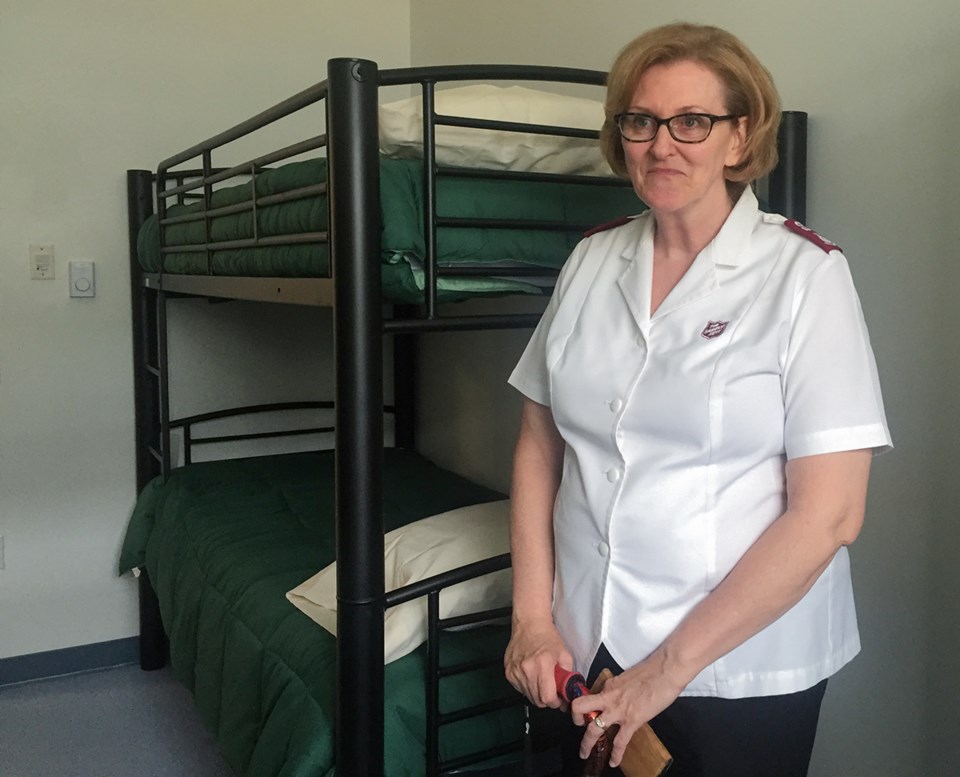The new homeless shelter, which opened Wednesday in Richmond, is the first of its kind in the city to accommodate men, women and couples.
“When I first came here in 2014, I said, ‘Where’s the women’s shelter?’ There isn’t one and I was stunned,” said Maj. Kathie Chiu, executive director of the Salvation Army, which will operate the new shelter.
While there is a women’s transition house in Richmond, its criteria for entrance is quite narrow, said Chiu.
However, the new 36-bed Salvation Army shelter, located at 12040 Horseshoe Way in Ironwood, is the first emergency shelter in the city to open its doors to women.
The new facility, which is a result of a three-way partnership between the City of Richmond, B.C. Housing and the Salvation Army, is replacing a smaller, 10-bed shelter on Shell Road, which was also run by the Salvation Army.
Of the 36 beds, 20 are for men, 10 for women and six will be “flex” beds.
The women’s dorm will be completely separated from the men’s, with its own facilities and outdoor area, said Chiu. The women are welcome to mingle with the general population, but can remain separate if they feel more comfortable.
The six-bed flex space – three rooms with two beds – is set aside for guests who are ill or referred by Vancouver Coastal Health, or anyone who is uncomfortable staying in the men’s or women’s dorms due to their gender orientation, said Chiu, adding that they want guests to feel safe.
“Usually 99 per cent of the time, homeless people are afraid of the regular people in society,” said Chiu.
“Many times people spit on them, say nasty things to them, deny them services – just traumatize them. So we are just aware that they need to feel safe and protected.”The flex area is also open to couples, which is another first for the shelter.
Normally, Chiu said, when couples enter a shelter, they have to split up into the men and women’s dorms.
“Oftentimes, homelessness is a traumatizing circumstance, and so keeping couples together is a good scenario,” said Chiu.
The shelter is aiming to transfer all of its existing guests from the Shell Road location by July 15, said Chiu, and will open five of the women’s beds at that time, giving staff a chance to orient the shelter to having more guests. After that, the rest of the beds will be opened.
On average, guests stay for about a month, and anyone in need can drop-in; the shelter, which is open 24/7, won't turn people away even if beds are full, Chiu said.
Each of the guests will be able to access the shelter’s support servicesoffered by caseworkers who will help determine each individual’s needs, next steps and personal goals, said Chiu.
According to the city, these services include life-skills training, employment programs and counselling, and referrals to health and legal services.
Meanwhile, B.C. Housing Minister Selina Robinson said “It’s important that people in need know there is a safe, warm place for them, with training and supports to help them move forward in their lives right here in Richmond.”
The shelter and Salvation Army have also launched a community advisory council – which meets a few times a year – in response to safety and security concerns raised by neighbouring businesses, as reported by the Richmond News two years ago.
One possible option raised by the community council, said Chiu, is to have volunteers at the shelter accompany anyone working late at a nearby business to the bus stop or until they feel safe.
Another suggestion is to host community lunches at the shelter, where local businesses could come to meet the guests, and in the fall, the shelter is planning on hosting a community barbeque.
“It’s just about being a good neighbour and learning about each other and how we view the world,” said Chiu.
“But I’m really confident that, as we gain traction in the neighbourhood and people begin to get to know us and get to know the clients that come stay with us, they’ll begin to change their perception.”
The shelter also has security cameras and lighting around the outside of the building, said Chiu.



